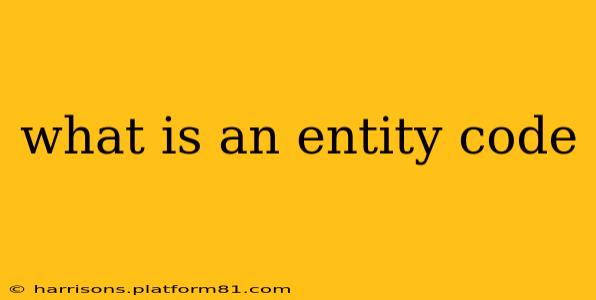What is an Entity Code?
An entity code is a unique identifier assigned to a specific entity within a particular system or database. The exact meaning and implementation of an entity code depend heavily on the context. There's no single, universal definition. Instead, think of it as a label – a unique alphanumeric string used to represent a specific item, person, organization, or concept. This label allows for easy identification and retrieval of information associated with that entity.
Think of it like a social security number for a person, but applicable to a much broader range of things. While a social security number identifies an individual, an entity code might identify:
- A company in a financial system: Each company might have a unique code for tracking transactions and financial data.
- A product in an inventory management system: Each product receives a code to streamline tracking, ordering, and sales reporting.
- A patient in a hospital system: Unique patient codes ensure accurate record-keeping and prevent confusion.
- A geographical location in a mapping system: Codes can represent countries, states, cities, or even specific addresses.
- A character in a video game: Each character, non-player character (NPC), or even item might be identified with a unique code.
How are Entity Codes Used?
Entity codes serve several crucial purposes:
- Data organization and retrieval: They facilitate efficient searching and retrieving data related to a specific entity.
- Data integrity: Unique codes help prevent data duplication and inconsistencies.
- Data standardization: Consistent use of entity codes ensures that data is standardized across different systems and departments.
- Automation: Entity codes are essential for automating processes such as inventory management, order processing, and financial reporting.
- Data security: Codes can be incorporated into security protocols to control access to sensitive information.
What Makes a Good Entity Code?
A well-designed entity code should possess the following characteristics:
- Uniqueness: It must be unique to each entity within the system.
- Conciseness: Shorter codes are easier to manage and less prone to errors.
- Meaningful (Optional): While not always necessary, a meaningful code can improve readability and understanding. For example, a product code might incorporate information about the product category or manufacturer.
- Consistency: A standardized format helps ensure consistency and reduces errors.
What are the Differences Between Entity Codes and Other Identifiers?
While entity codes are similar to other identifiers like primary keys in databases or unique identifiers in APIs, there are subtle differences. Entity codes are often designed for human readability and management in addition to their role in machine-readable systems. Primary keys, on the other hand, are typically designed purely for database efficiency and aren't always human-friendly.
Where can I find more information about specific entity codes?
The specific format and usage of entity codes vary widely depending on the context and the system that employs them. To find information about a specific entity code, you'll need to consult the documentation or support resources for the system in question.
This comprehensive explanation should provide a clear understanding of entity codes and their broad applications across numerous systems and industries. Remember, the key takeaway is that an entity code is a flexible and powerful tool for managing and identifying data related to various entities.
